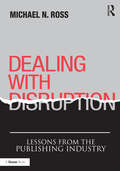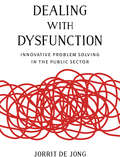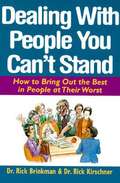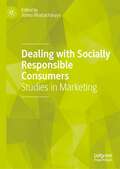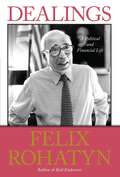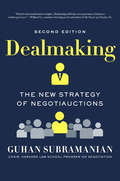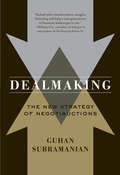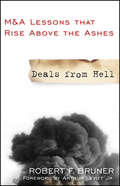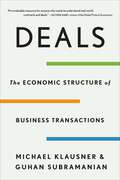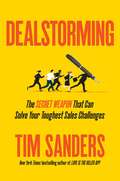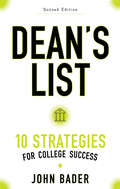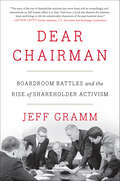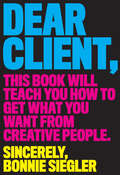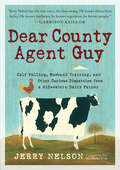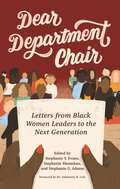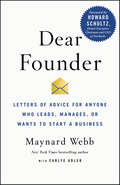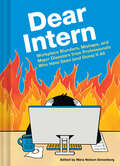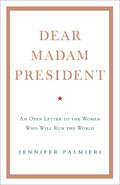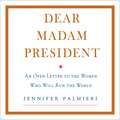- Table View
- List View
Dealing with Disruption: Lessons from the Publishing Industry
by Michael N. RossPublishing today requires a presence in local and global markets, and successful publishers can be more effective in reaching both by employing current technology at all stages of the publishing process. Finding the most efficient and profitable business models has become more challenging (and more rewarding) by the same advancements in technology. Michael Ross provides a roadmap to the essential aspects of the international publishing industry, from how to develop content that can be easily adapted to other cultures, to establishing relationships and negotiating licensing and co-publishing contracts. With a discussion of the critical innovations in the industry and through case studies from all stages in the publishing process, the book provides insights into the maturing of digital publishing and the challenges and opportunities provided by new technologies. Many publishing models have emerged over the last 15 years, and technology has made the mechanics of publishing in general, and web publishing in particular, easier. Thus, the role of the professional publisher is being challenged, and issues of quality and trust are now competing with easy access to information. Publishing, in all forms, can be viewed as a conspicuous bellwether for any business that must make strategic and tactical adjustments quickly to innovate and grow. Ross applies principles from both consumer and educational publishing to explore publishing's ongoing 'sea change' and its implications for other industries.
Dealing with Dysfunction: Innovative Problem Solving in the Public Sector
by Jorrit De JongCongressional impasse, financially untenable social programs, and fiscal crises are hallmarks of bureaucratic dysfunction today.Jorrit de Jong explains that bureaucratic dysfunction reflects a breach of contract between the government-not only as a provider of services, but also as a catalyst for improved social outcomes-and a public comprised of clients, professionals, managers, and policymakers. Dealing with Dysfunction embarks on a conceptual, theoretical, and empirical investigation to understand why bureaucratic dysfunction is a public problem and what can be done to solve it.Jorrit employs real-world data from the Kafka Brigade, a research team he founded. Building on this research, he presents fourteen case studies that provide typical examples of larger problems applicable to a broad base of clients to illustrate how stakeholders can enact an inclusive process for identifying, defining, diagnosing, and remedying incidences of red tape.Dealing with Dysfunction highlights the failings of standard approaches to solving institutional dilemmas and offers conceptual frameworks, theoretical insights, and practical lessons for dealing with bureaucratic dysfunction in practice. It challenges conventional approaches of "fighting bureaucracy" and "reducing red tape" and emphasizes rigorous public problemsolving for making government more effective, efficient, and equitable.
Dealing with People You Can’t Stand: How to Bring Out the Best in People at Their Worst
by Rick Kirschner Rick Brinkman"It may be a boss who behaves like a bully and a petty tyrant, and has the power to get away with it ..." "It may be a co-worker who promises results, but who never, ever delivers when the chips are down ..."
Dealing with Socially Responsible Consumers: Studies in Marketing
by Jishnu BhattacharyyaThis book contains a collection of teaching cases that study and emphasise how twenty-first-century businesses address and satisfy the needs and wants of socially conscious consumers while remaining profitable. This book explores the practise of marketing for societal benefit through real-life case studies. It provides a critical understanding of marketing approaches such as social marketing, sustainability marketing, and other practises of a similar nature. This book is made up of both long and short real-life cases from various industries, with varying degrees of difficulty.
Dealing with the Dragon: A Year in the New Hong Kong
by Jonathan FenbyWhat the new Hong Kong is like.
Dealings: A Political and Financial Life
by Felix G. RohatynIt was a German soldier’s chance decision to reach for a cigarette and absently wave a car through a checkpoint outside Marseille in 1940 that allowed Felix Rohatyn and his Jewish family to escape from Nazi-occupied France. In the States, a chance summer job led him to the small, private investment bank of Lazard Frères, where he came under the tutelage of legendary financier André Meyer. The summer job turned into an extraordinary fifty-year career. Hailed as "the preeminent investment banker of his generation," Rohatyn was a creator of the merger-and-acquisition business that revolutionized investment banking and transformed the worlds of finance and entertainment. In this very personal account, Rohatyn takes us behind the headlines to offer readers a telling look at some of the era’s most renowned figures in the worlds of finance, entertainment, and politics. We are alongside Rohatyn as he meets Steve Ross in the back of the funeral parlor Ross is managing as they strategize to take control of Warner Brothers, and in André Meyer’s art-filled apartment as they negotiate with Frank Sinatra. We are with Rohatyn as he assists Harold Geneen of ITT weather a series of congressional investigations, and as he stays one step ahead of the canny Michael Ovitz as Matsushita attempts to win control of Lew Wasserman’s Universal Pictures. We also watch Rohatyn defending shareholders’ interests as the RJR-Nabisco buyout becomes a cautionary tale of executive greed. We have a front-row seat as Rohatyn and Governor Hugh Carey forge a desperation plan to save New York City from bankruptcy. And we accompany Rohatyn when he returns to Paris as the U.S. ambassador to the country he barely escaped alive as a young boy. Full of headline-making revelations, insider stories, keen personal observations, and relevant financial wisdoms, Dealings is the page-turning story of a life well lived.
Dealmaking (Second Edition): The New Strategy Of Negotiauctions
by Guhan SubramanianBased on broad research and detailed case studies, Dealmaking provides the jargon-free, empirically sound advice you need to close the deal. Leading dealmaking scholar Guhan Subramanian specializes in understanding how deals work. As a Harvard Business School professor, he has spent years examining and teaching corporate dealmaking through two classic lenses: negotiation theory and auction theory. As he looked at real-world situations, however, he discovered that complex deals usually combine both approaches: negotiators are "fighting on two fronts"—across the table and on the same side—with known, unknown, or potential competitors. In Dealmaking, Subramanian provides classroom-tested examples of "negotiauctions" as diverse as buying a house, haggling over the rights to the television show Frasier, or selling "toxic" assets into the U.S. government’s bailout fund. With each scenario, he identifies the specific moves that ensure success. The first book to bring together auction and negotiation strategies in a meaningful way, Dealmaking is an indispensable guide to negotiating deals in the twenty-first century.
Dealmaking: The New Strategy of Negotiauctions
by Guhan Subramanian"Packed with transformative insights, Dealmaking will help a new generation of business leaders get to yes."--William Ury, coauthor of Getting to Yes Informed by meticulous research, field experience, and classroom-tested strategies, Dealmaking offers essential insights for anyone involved in buying or selling everything from cars to corporations. Leading business scholar Guhan Subramanian provides a lively tour of both negotiation and auction theory, then takes an in-depth look at his own hybrid theory, outlining three specific strategies readers can use in complex dealmaking situations. Along the way, he examines case studies as diverse as buying a house, haggling over the rights to a TV show, and participating in the auction of a multimillion-dollar company. Based on broad research and detailed case studies, Dealmaking brings together negotiation and auction strategies for the first time, providing the jargon-free, empirically sound advice professionals need to close the deal. Originally published in hardcover under the title Negotiauctions.
Deals from Hell: M&A Lessons that Rise Above the Ashes
by Robert F. BrunerA detailed look at the worst M&A deals ever and the lessons learned from them It's common knowledge that about half of all merger and acquisition (M&A) transactions destroy value for the buyer's shareholders, and about three-quarters fall short of the expectations prevailing at the time the deal is announced. In Deals from Hell, Robert Bruner, one of the foremost thinkers and educators in this field, uncovers the real reasons for these mishaps by taking a closer look at twelve specific instances of M&A failure. Through these real-world examples, he shows readers what went wrong and why, and converts these examples into cautionary tales for executives who need to know how they can successfully navigate their own M&A deals. These page-turning business narratives in M&A failure provide much-needed guidance in this area of business. By addressing the key factors to M&A success and failure, this comprehensive guide illustrates the best ways to analyze, design, and implement M&A deals. Filled with in-depth insights, expert advice, and valuable lessons gleaned from other M&A transactions, Deals from Hell helps readers avoid the common pitfalls associated with this field and presents them with a clear framework for thinking about how to make any M&A transaction a success.
Deals on the Green
by David RyneckiA fun, inspirational look at corporate America's favorite pastime No matter how sophisticated business becomes, nothing can replace the golf course as a communication hub. It's where up-and-comers can impress the boss and where CEOs can seal multibillion-dollar deals. It's no coincidence that many of the most admired people in business-Jack Welch, Bill Gates, Warren Buffett, Sandy Weill-always carved out time in their busy schedules for golf. Deals on the Green takes us inside the gates of elite courses like Augusta National and Pebble Beach to reveal how important golf really is. It tells entertaining stories about the people who rely on golf to drive their success in business, from John D. Rockefeller a century ago to Donald Trump today. Some of those you'll meet:* Wayne Huizenga, the founder of Blockbuster, who was so golf obsessed that he created his own personal course in Florida. * Jeff Immelt, CEO of General Electric, who won Jack Welch's blessing for the big job after proving himself on the golf course. * Stan O'Neal, CEO of Merrill Lynch, who became the most powerful black executive in America-and a late bloomer at golf. A perfect gift for dads, grads, bosses, and avid golfers of all ages, Deals on the Green will make you think about golf, and business, in a whole new way.
Deals on the Green
by David RyneckiNo matter how sophisticated the tools become-the e-mails and teleconferencing, the BlackBerries and PowerPoints-golf remains the true communications hub of American business In the history of American business there have been more deals consummated on the golf course than in any boardroom or five-star restaurant. It's no accident that executives from J. D. Rockefeller to Jack Welch have made time in their busy schedules for eighteen holes. Deals on the Green takes a fresh look at the interesting worlds of golf and business. It's not a "how to win business" instructional, but it does offer lessons about what is required to succeed in golf and in business-namely friendship, imagination, tenacity, multitasking, guts, passion, and compassion. And it shares great inside stories about the leaders whose devotion to and respect for the game have contributed to their success in business. Financial journalist David Rynecki takes us inside the gates of elite courses such as Augusta National and Pebble Beach to reveal how the wealthy and powerful really behave-or misbehave. He lets us in on the keys to mixing business and pleasure, the best way to swing a nine iron in front of your boss, and even what to do if you happen to slice it.
Deals: The Economic Structure of Business Transactions
by Guhan Subramanian Michael KlausnerDrawing on real-life cases from a wide range of industries, two acclaimed experts offer a sophisticated but accessible guide to business deals, designed to maximize value for your side.Business transactions take widely varying forms—from multibillion-dollar corporate mergers to patent licenses to the signing of an all-star quarterback. Yet every deal shares the same goal, or at least should: to maximize the joint value created and to distribute that value among the parties. Building on decades of experience teaching and advising on business deals, Michael Klausner and Guhan Subramanian show how to accomplish this goal through rigorous attention to designing incentives, conveying information, and specifying parties’ rights and obligations.Deals captures the range of real-life transactional complexities with case studies covering Microsoft’s acquisition of LinkedIn, Scarlett Johansson’s contract dispute with Disney over the release of Black Widow, litigation surrounding LVMH’s pandemic-disrupted acquisition of Tiffany, the feud between George Norcross and Lewis Katz over ownership of the Philadelphia Inquirer, NBC/Viacom’s negotiation with Paramount over the final three seasons of Frasier, and many more. In clear, concise terms, Klausner and Subramanian establish the basic framework of negotiation and the economic concepts that must be addressed in order to maximize value. They show how to tackle challenges, such as information asymmetry between buyer and seller, moral hazard, and opportunistic behavior. And the authors lay out responses to common risks associated with long-term contracts, emphasizing that a deal’s exit rights should be carefully considered at the start of transaction design.Unique in its practical application of economic theory to actual dealmaking, this book will be an indispensable resource for students and for professionals across the business and legal world.
Dealstorming: The Secret Weapon That Can Solve Your Toughest Sales Challenges
by Tim SandersSales genius is a team sport. As a B2B sales leader, you know that by Murphy's Law, despite your team's best efforts, some deals will inevitably get stuck or key relationships will go sour. And too often, it's the most important ones--the last thing you need when millions of dollars are on the line. "Dealstorming" is Tim Sanders's term for a structured, scalable, repeatable process that can break through any sales deadlock. He calls it "a Swiss Army knife for today's toughest sales challenges." It fixes the broken parts of the brainstorming process and reinvigorates account management for today's increasingly complicated sales environment. Dealstorming drives sales innovation by combining the wisdom and creativity of everyone who has a stake in the sale. You may think you are applying teamwork to your challenges, but don't be so sure. There's a good chance you're operating inside a sales silo, not building a truly collaborative team across your whole company. The more disciplines you bring into the process, the more unlikely (but effective!) solutions the team can come up with. Sanders explains his seven-step Dealstorming process and shows how it has helped drive results for companies as diverse as Yahoo!, CareerBuilder, Regus, and Condé Nast. You'll learn how to get the right team on board for a new dealstorm, relative to the size of the sales opportunity and its degree of difficulty. The key is adding people from non-sales areas of your company, making them collaborators early in the process. That will help them own the execution and delivery after the deal is done. The book includes real world examples from major companies like Oracle and Skillsoft, along with problem finding exercises, innovation templates, and implementation strategies you can apply to your unique situation. It's based on Sanders' many years as a sales executive and consultant, personally leading dozens of sales collaboration projects. It also features the results of interviews with nearly two hundred B2B sales leaders at companies such as LinkedIn, Altera and Novell. The strategies laid out in Dealstorming have led to a stunning 70% average closing ratio for teams across all major industries, leading to game-changing deals and long-term B2B relationships. Now you can learn how to make dealstorming work for you.From the Hardcover edition.
Dean's List: Ten Strategies for College Success
by John BaderYou’ve gotten into college. This is the book you need to succeed.All of your hard work in high school has paid off: you have a solid GPA, numerous extracurricular achievements to your name, and an acceptance letter from an excellent college. Now what? What can you expect from the college experience, and how can you get the most out of it? This book will answer your questions and help you find real and lasting success in college. Deans at America's top institutions—including Harvard, Princeton, Stanford, Yale, and Columbia—join John Bader to tell you what you need to know to have a rich and rewarding college experience. With wisdom, reassurance, and an insider's perspective, this lively and timely guide will help you develop strategies such as:• Focus on learning, not on grades• Build a new relationship with your parents• Explore your academic choices• Learn from diversity at home and abroad• Cope with failure• Plan boldly for life after collegeA complete reworking, this second edition includes information on managing workloads and faculty relationships, as well as new material focused on first-generation challenges and international students. Dean's List offers a thoughtful, commonsense approach to higher education that allows students to make the most of their four years on campus—and beyond.
Dear Celebrity
by Julian HenbyWelcome to the weird and wonderful world of Julian Henby. For some time now, Julian, the Bridget Jones of letter writing, has been badgering decent, hard-working celebrities with a barrage of frankly absurd correspondence, often relating to his dysfunctional family and pets. Dear Celebrity is a compilation of some of his finest work and includes many of the best celebrity responses. So, can Matthew Kelly find Henby's mother a job as a Bearded Lady? Will Professor Lord Robert Winston be able to do anything to help Julian's hamster, David, whose locomotion is severely impaired by his erection which drags along the floor like a fifth leg? Will Joanna Lumley find the time to visit Julian's elderly uncle to talk about her career? And why does Sir Jimmy Savile insist on being the Loch Ness monster?The answers to these and many more questions are to be found here...
Dear Chairman: Boardroom Battles and the Rise of Shareholder Activism
by Jeff GrammAn “engaging and informative” history of one of capitalism’s longest-running tensions—the high-stakes battles between management and shareholders (The New Yorker).Recent disputes between shareholders and major corporations, including Apple and DuPont, have made headlines. But the struggle between management and those who own stock has been going on for nearly a century. Mixing never-before-published and rare, original letters from Wall Street icons—including Benjamin Graham, Warren Buffett, Ross Perot, Carl Icahn, and Daniel Loeb—with masterful scholarship and professional insight, Dear Chairman traces the rise in shareholder activism from the 1920s to today, and provides an invaluable and unprecedented perspective on what it means to be a public company, including how they work and who is really in control.Jeff Gramm analyzes different eras and pivotal boardroom battles, using the letters to show how investors interact with directors and managers, how they think about their target companies, and how they plan to profit. Each is a fascinating example of capitalism at work told through the voices of its most colorful, influential participants.A hedge fund manager and adjunct professor at Columbia Business School, Gramm has seen public companies that are poorly run, and some that willfully disenfranchise their shareholders. While he pays tribute to the ingenuity of public company investors, Gramm also exposes examples of shareholder activism at its very worst, when hedge funds engineer stealthy land-grabs at the expense of a company’s long-term prospects. Ultimately, he provides a thorough, much-needed understanding of the public company/shareholder relationship for investors, managers, and everyone concerned with the future of capitalism.“An illuminating read for those wondering what drives activists.” —The Wall Street Journal“An excellent read . . . Gramm has collected a series of deliciously rich letters, many of which were never before published.” —The New York Times“The story of the rise of shareholder activism has never been told as compellingly . . . a book that dissects the dramatic deals and brings to life the unbelievable characters of the past hundred years.” —Arthur Levitt, former chairman, US Securities and Exchange Commission
Dear Client: This Book Will Teach You How to Get What You Want from Creative People
by Bonnie SieglerIn a world where every business, brand, product, and service needs a strong visual identity, it’s critical for clients and creative professionals to work together. And the key to success, as with any relationship, is communication. In Dear Client, award-winning graphic designer Bonnie Siegler offers an invaluable step-by-step guide to how to talk so creatives will listen, and how to listen when creatives talk. Written as a series of honest, friendly lessons—“Know What You Like,” “Decide Who Will Decide,” “Focus Groups Suck,” “Don’t Say ‘Make It Yellow,’ Say ‘Make It Sunny,’” “Serve Lunch During Lunchtime Meetings”—it shows exactly how to deal with the subjectivity, emotional pitfalls, and occasional chaos of a creative partnership. Here’s how to articulate your visual goals and set a clear, consistent direction. How to give feedback that works and avoid words that inhibit creative thinking. How to be open to something you didn’t imagine. And most of all, how to have fun, save money, and get the results you want.
Dear County Agent Guy: Calf Pulling, Husband Training, and Other Curious Dispatches from a Midwestern Dairy Farmer
by Jerry Nelson“Jerry Nelson’s column comes from the true heart of the Midwest. He has the true voice, the slow twang. He knows wheat from barley. He knows hardware, he knows vegetation, he knows people.”—Garrison Keillor In the tradition of Mark Twain and Jean Shepherd, Dave Barry and Garrison Keillor, Jerry Nelson is a humorist whose beat is the American heartland, a small-town world of pickup trucks and Sunday night pancake dinners, dropping in on neighbors and complaining about the county agent. His depictions of daily life, from the point of view of an ex-dairy farmer and taciturn husband with a twinkle in his eye, are read by 250,000 people a week—and occasionally woven into Prairie Home Companion scripts. These are stories of courtship; childbirth—he offers the delivery room doctor the use of his calf puller; family; neighbors; chores; and the duties of a father—why is it that a man who spends his days in cow manure can’t change a baby’s diaper? Knee-slappingly funny one moment, poignant the next, it’s a very special look at a distinctly American way of life.
Dear Department Chair: Letters from Black Women Leaders to the Next Generation
by Julia S. Jordan-Zachery Stephanie Shonekan Stephanie Adams Stephanie Evans Carol Henderson Tiffany Gilbert Sandra Jowers-Barber Eunice Jeffries April C. Langley Tracy Sharpley-Whiting Colette Taylor Regine Jean-Charles Theresa Rajack-Talley Janaka LewisPractical and candid, this book offers actionable steps to help Black women leaders create meaningful success. The reflections and recommendations of the contributors forge a critical and transformative analysis of race, gender, and higher education leadership. With insights from humanities, social sciences, art, and STEM, this essential resource helps to redefine the academy to meet the challenges of the future. Dear Department Chair is comprised of personal letters from prominent Black women department chairs, deans, vice provosts, and university presidents, addressed to current and future Black women academic professionals, and offers a rich source of peer mentorship and professional development. These letters emerged from Chair at the Table, a research collective and peer-mentoring network of current and former Black women department chairs at colleges and universities across the U.S. and Canada. The collective’s works, including this volume, serve as tools for faculty interested in administration, current chairs seeking mentorship, and upper-level administrators working to diversify their ranks.
Dear Digital, We need to talk: A guilt-free guide to taming your tech habits and thriving in a distracted world
by Kristy GoodwinSuffering with toxic tech-habits? Zoom fatigue? Digital dementia? Burnout? Many of us have adopted unhealthy and unsustainable digital habits that are not only putting a dent in our performance and productivity, they are also seriously impacting both our physical health and mental wellbeing.But it's no longer realistic to simply throw away our laptops or cancel our Netflix subscriptions. Whether we love it or loathe it, technology is here to stay. Dear Digital, We need to talk provides realistic, research-based ways to cultivate healthy and helpful digital habits that work with our brains and bodies, rather than against them. It presents a menu of practical micro-habits designed to bolster your productivity and support your wellbeing in our always-on, digitally distracted world.This book does not advocate for a #digitaldetox (in fact, it explores why detoxes don' t work), nor does it propose that you digitally amputate yourself. Instead, Dear Digital, We need to talk will help you take back control of your attention and use technology in ways that will support your performance and wellbeing, rather than stifle it.
Dear Ernest and Julio: The Ordinary Guy's Search for the Extraordinary Job
by Fred Grimes David FreedMeet Fred Grimes, an ordinary out-of-work guy who has just embarked on the most outrageous job search in the history of employment. From Idi Amin to Playboy, Bill Clinton to Calvin Klein, Fred sent job application letters to more than one hundred of the most famous, unusual, and unlikely people and companies in the world. Fred may be the only man ever to simultaneously apply for jobs as a wine taster, bullpen catcher, Barbara Eden's houseboy, priest, Sea World whale trainer, Santa, Power Ranger, U.S. poet laureate, and American Bandstand dancer."An affable effort that deserves the praise bestowed by the director of the U.S. Mint: 'Thank you for your entertaining letter.' B" - Entertainment Weekly
Dear Founder: Letters of Advice for Anyone Who Leads, Manages, or Wants to Start a Business
by Carlye Adler Maynard WebbThe Los Angeles Times and USA Today bestseller!Wise, practical, and profitable letters to entrepreneurs, leaders, managers, and business owners in every field—from a leading executive, investor, and business founderMore than 600,000 new businesses are launched each year. How can a start-up find the funding it needs to survive? When, if at all, should a company go public? How does an entrepreneur build and manage a workplace—and create a lasting legacy?Maynard Webb has helped found, fund, and grow dozens of successful companies, and has driven strategic change at Salesforce, eBay, Everwise, and Visa, among other worldwide corporations. Known for offering savvy insight, encouragement, and a dose of reality in the form of engaging personal letters to a select group of business leaders, Webb now shares his lessons with the rest of America’s aspiring entrepreneurs—at any age and stage in their careers—in Dear Founder.Featuring more than eighty inspiring, informative, and instructive letters, Dear Founder is rich with sound advice on an array of business topics, from turning your idea into a reality to building a culture, to reaching key financial goals. This book is an indispensable guide to navigating the realities, risks, and rewards of being your own boss—and founding the company of your dreams.
Dear Intern
by Mara Nelson-GreenbergEveryone makes mistakes—especially in their first job. Cringe and commiserate with the everyday missteps and epic workplace screwups in this collection of self-confessed blunders from disaster‑prone‑yet‑good‑intentioned interns finding their footing in professional settings.All tenured professionals know that detours and mishaps are an essential rite of passage en route to a successful career—but that doesn't make them any less funny. This curated collection of true intern confessions, from minor mistakes to major messes, is the workplace humor book everyone can relate to. Whether spilling coffee on the boss's laptop or drunkenly sending out a personal tweet on the company's Twitter account, these first-hand stories comprise a cringe- and compassion-inducing celebration of the many memorable blunders that can (and do) happen in our entry‑level years.UNIQUE ADULTING BOOK: This one-of-a-kind collection of hilarious intern stories is the perfect way for current and past interns and entry-level newbies to commiserate over embarrassing moments and lessons learned. RELATABLE HUMOR: Whether you are about to start an internship, currently are an intern, or were once an intern, these stories are a great reminder that levity in the workplace makes all the difference in getting through any given day. Everyone has humiliating slipups, and it is comforting to share them.GREAT GIFT FOR GRADS: What better way to celebrate the trials and tribulations of the workforce than a book poking fun at interns and their amusing mistakes? For anyone from recent graduates to long-standing coworkers, this is perfect as a funny first-job gift or work-iversary present.Perfect for:Graduates and young professionalsGift-giving between coworkers or from bosses to internsComedy and humor fansShort story and essay collection readersFans of The Office, Parks and Recreation, and Office Space
Dear Madam President: An Open Letter to the Women Who Will Run the World
by Jennifer PalmieriTHE NUMBER ONE NEW YORK TIMES BESTSELLERDEAR MADAM PRESIDENT is an empowering letter from former White House Communications Director Jennifer Palmieri to the first woman president, and by extension, to all women working to succeed in any field. By using lessons learned during her experiences with Hillary Clinton, President Obama, and Elizabeth Edwards - to name a few - Palmieri through each chapter creates a forward-thinking framework of inspirational and practical advice for all women everywhere - from boardrooms to living rooms - who are determined to seize control of their lives, their workplaces, and their country. DEAR MADAM PRESIDENT will turn the results of the 2016 election into something incredibly empowering for future female leaders and independent thinkers everywhere.We haven't wrapped our heads around what it should look like for a woman to be in the job of President. Our only models are men. This of course was seen during the Hillary Clinton campaign, and no one knows this better than Jennifer Palmieri. While wildly disappointed by the outcome of the election, Palmieri optimistically argues in the book that the Clinton candidacy and all she experienced on the campaign trail - confusion, admiration, hate, love, acceptance, rejection - can now open the country up to reimagining women in leadership roles. And that is what Palmieri takes on in this book - redefining expectations for women looking to lead and creating a blueprint for women candidates and leaders to follow.
Dear Madam President: An Open Letter to the Women Who Will Run the World
by Jennifer PalmieriDEAR MADAM PRESIDENT is an empowering letter from former White House Communications Director Jennifer Palmieri to the first woman president, and by extension, to all women working to succeed in any field. By using lessons learned during her experiences with Hillary Clinton, President Obama, and Elizabeth Edwards--to name a few--Palmieri through each chapter creates a forward-thinking framework of inspirational and practical advice for all women everywhere--from boardrooms to living rooms--who are determined to seize control of their lives, their workplaces, and their country. DEAR MADAM PRESIDENT will turn the results of the 2016 election into something incredibly empowering for future female leaders and independent thinkers everywhere.We haven't wrapped our heads around what it should look like for a woman to be in the job of President. Our only models are men. This of course was seen during the Hillary Clinton campaign, and no one knows this better than Jennifer Palmieri. While wildly disappointed by the outcome of the election, Palmieri optimistically argues in the book that the Clinton candidacy and all she experienced on the campaign trail--confusion, admiration, hate, love, acceptance, rejection--can now open the country up to reimagining women in leadership roles. And that is what Palmieri takes on in this book--redefining expectations for women looking to lead and creating a blueprint for women candidates and leaders to follow.(P)2018 Hachette Audio
